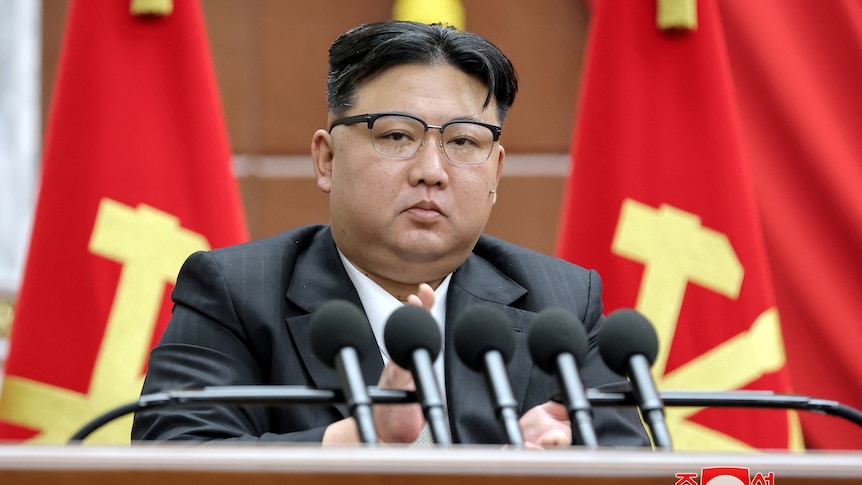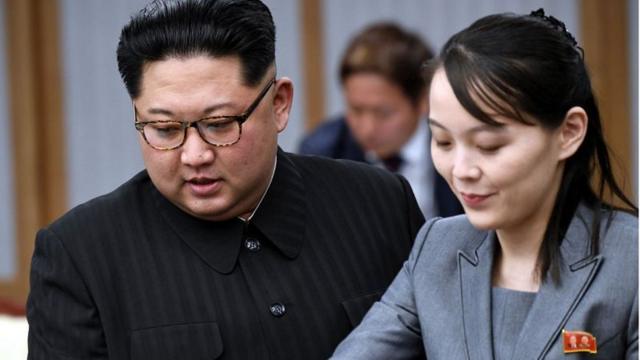Understanding Kim Jong-un's Leadership: A Complex Portrait
Introduction:
Kim Jong-un, the enigmatic leader of North Korea, has been a subject of global fascination and concern. Inherited power from his father, Kim Jong-il, in 2011, he assumed control of one of the world's most isolated and secretive regimes. This essay seeks to delve into the multifaceted persona of Kim Jong-un, exploring his background, leadership style, domestic policies, international relations, and the complexities of his rule.
Background and Rise to Power:
Kim Jong-un was born on January 8, 1983, or 1984 (exact date uncertain), as the youngest son of Kim Jong-il and his consort, Ko Yong-hui. Despite his privileged upbringing, Kim Jong-un's early life remains largely shrouded in secrecy. He received education in Switzerland under an assumed identity, known as "Pak Un." His return to North Korea in the late 2000s marked the beginning of his grooming for leadership succession.
Upon the death of his father in December 2011, Kim Jong-un ascended to power, assuming the titles of Supreme Leader and Chairman of the Workers' Party of Korea (WPK). His ascent to power was swift, bolstered by the regime's propaganda machinery and the support of key military and party elites. Despite initial doubts about his leadership capabilities due to his youth and inexperience, Kim Jong-un swiftly consolidated power, executing strategic purges to eliminate potential rivals and solidify his authority.
Leadership Style and Domestic Policies:
Kim Jong-un's leadership style is characterized by a combination of ruthlessness, pragmatism, and an emphasis on maintaining absolute control over North Korean society. His regime has continued the cult of personality surrounding the Kim dynasty, portraying him as an infallible and revered leader through state propaganda and indoctrination.
Domestically, Kim Jong-un has pursued a policy of "byungjin," or parallel development, which prioritizes both the advancement of nuclear weapons and economic development. Despite international sanctions and isolation, Kim has made efforts to bolster the North Korean economy, albeit with limited success. Initiatives such as the "Byungjin Line" and the promotion of special economic zones aim to attract foreign investment and stimulate growth, albeit within the confines of a highly centralized command economy.
However, Kim Jong-un's rule is also marked by widespread human rights abuses, including political repression, forced labor camps, and strict censorship. The regime's prioritization of military spending and nuclear weapons development has come at the expense of the well-being of the North Korean populace, many of whom face poverty and food insecurity.
International Relations and Nuclear Ambitions:
Kim Jong-un's tenure has been defined by North Korea's persistent pursuit of nuclear weapons and ballistic missile capabilities, posing a significant challenge to regional stability and global security. Despite facing international condemnation and sanctions, Kim Jong-un has accelerated North Korea's nuclear program, conducting numerous missile tests and advancing its nuclear arsenal.
The regime's nuclear ambitions serve multiple purposes, including regime survival, deterrence against perceived external threats, and leveraging negotiations for economic concessions and diplomatic recognition. Kim Jong-un has adopted a strategy of "maximum pressure and engagement," alternating between provocative actions and diplomatic overtures to extract concessions from the international community. Notable diplomatic developments during Kim Jong-un's leadership include the historic summits with South Korean President Moon Jae-in and meetings with U.S. President Donald Trump. While these encounters raised hopes for a breakthrough in denuclearization talks, negotiations have ultimately stalled, highlighting the complexities and distrust underlying the North Korean nuclear issue.
Notable diplomatic developments during Kim Jong-un's leadership include the historic summits with South Korean President Moon Jae-in and meetings with U.S. President Donald Trump. While these encounters raised hopes for a breakthrough in denuclearization talks, negotiations have ultimately stalled, highlighting the complexities and distrust underlying the North Korean nuclear issue.
Challenges and Future Prospects:
Kim Jong-un faces a myriad of challenges, both domestically and internationally, as he seeks to consolidate his regime's grip on power and advance its strategic objectives. Domestically, socioeconomic reforms and the need to address widespread poverty and deprivation pose formidable obstacles to the regime's stability. Internationally, the prospect of escalating tensions with the United States and regional powers, coupled with the specter of further sanctions and isolation, presents significant risks to North Korea's security and economic viability. However, Kim Jong-un's leadership also exhibits a degree of pragmatism and adaptability, as evidenced by his willingness to engage in diplomacy and explore avenues for international engagement. The future trajectory of North Korea under Kim Jong-un's rule remains uncertain, contingent upon a complex interplay of internal dynamics, external pressures, and geopolitical developments.
However, Kim Jong-un's leadership also exhibits a degree of pragmatism and adaptability, as evidenced by his willingness to engage in diplomacy and explore avenues for international engagement. The future trajectory of North Korea under Kim Jong-un's rule remains uncertain, contingent upon a complex interplay of internal dynamics, external pressures, and geopolitical developments.
Kim Jong-un's leadership of North Korea represents a complex and enigmatic phenomenon, characterized by a combination of authoritarianism, strategic calculation, and a cult of personality. His regime's pursuit of nuclear weapons and ballistic missile capabilities poses significant challenges to regional stability and global security, while his domestic policies prioritize regime survival and control at the expense of the well-being of the North Korean populace.
As North Korea continues to navigate a precarious geopolitical landscape, understanding the nuances of Kim Jong-un's leadership is essential for formulating effective policies aimed at addressing the regime's nuclear ambitions, human rights abuses, and socioeconomic challenges. Whether Kim Jong-un's rule will usher in a new era of engagement and reform or perpetuate the status quo of isolation and repression remains an open question, with profound implications for the Korean Peninsula and the broader international community.
While Kim Jong-un's leadership presents a formidable challenge to the international community, it also offers opportunities for engagement and dialogue. Efforts to address the North Korean nuclear issue and promote peace on the Korean Peninsula require a multifaceted approach that combines diplomatic initiatives, economic incentives, and pressure tactics aimed at altering the calculus of the regime. Diplomatic engagement remains a crucial avenue for addressing North Korea's nuclear ambitions and promoting stability in Northeast Asia. Despite past setbacks, sustained dialogue and confidence-building measures are essential for building trust and reducing tensions on the Korean Peninsula. International forums such as the Six-Party Talks, involving North Korea, South Korea, China, Japan, Russia, and the United States, provide a framework for multilateral negotiations aimed at achieving denuclearization and peace.
Diplomatic engagement remains a crucial avenue for addressing North Korea's nuclear ambitions and promoting stability in Northeast Asia. Despite past setbacks, sustained dialogue and confidence-building measures are essential for building trust and reducing tensions on the Korean Peninsula. International forums such as the Six-Party Talks, involving North Korea, South Korea, China, Japan, Russia, and the United States, provide a framework for multilateral negotiations aimed at achieving denuclearization and peace.
Furthermore, economic incentives and development assistance can play a pivotal role in encouraging North Korea to prioritize economic reforms and engage in constructive dialogue. Initiatives aimed at fostering economic interdependence and integration, such as joint economic projects and humanitarian assistance, can help alleviate the suffering of the North Korean people and create incentives for the regime to pursue denuclearization and normalization of relations. At the same time, the international community must maintain pressure on North Korea through targeted sanctions and diplomatic isolation to compel compliance with international norms and obligations. Strict enforcement of sanctions, coupled with robust monitoring and enforcement mechanisms, can increase the cost of North Korea's pursuit of nuclear weapons and incentivize a return to negotiations.
At the same time, the international community must maintain pressure on North Korea through targeted sanctions and diplomatic isolation to compel compliance with international norms and obligations. Strict enforcement of sanctions, coupled with robust monitoring and enforcement mechanisms, can increase the cost of North Korea's pursuit of nuclear weapons and incentivize a return to negotiations.
Ultimately, resolving the North Korean nuclear issue and promoting peace on the Korean Peninsula requires a comprehensive and sustained effort by the international community, guided by principles of dialogue, engagement, and deterrence. While the path ahead may be fraught with challenges and uncertainties, concerted action and cooperation offer the best chance for achieving a peaceful resolution to one of the world's most pressing security challenges.In conclusion, understanding Kim Jong-un's leadership is essential for navigating the complexities of North Korea's domestic politics, international relations, and nuclear ambitions. While his regime presents formidable challenges to regional stability and global security, it also offers opportunities for engagement and dialogue. By pursuing a multifaceted approach that combines diplomatic initiatives, economic incentives, and pressure tactics, the international community can work towards a peaceful resolution of the North Korean nuclear issue and promote stability on the Korean Peninsula.





































